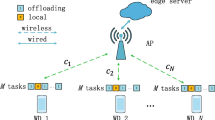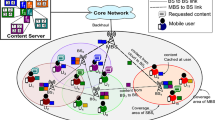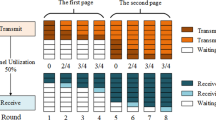Abstract
Mobile edge computing (MEC) is a key feature of next generation heterogeneous networks aimed at providing a variety of services for different applications by performing related processing tasks closer to the user equipment. In this research we investigated on connection management in multi-access edge computing systems using intelligent offloading and caching strategy. This paper presents joint QoS-aware resource allocation and mobile edge computing in multi-access heterogeneous networks in order to maximize total system’s energy efficiency in addition to guaranty the users QoS requirements. Firstly, based on the multi-server MEC scenario, a new goal function is designed considering calculation and communication models, in order to decreasing the completion time of all computing tasks and achieving optimal energy efficiency under delay constraints. Then, the continues carrier allocation and user association variables in addition to the interference coordination incorporated in the goal function, modifies the primary optimization problem to a mixed integer nonlinear programming (MINLP). Also, considering user’s minimum data rate and maximum transmission power constraints, a carrier-matching algorithm is introduced to obtain the optimal channel allocation strategy, which first matches the user with the channel and subsequently, the Dinkelbach-like method is applied to obtain the optimal resource allocation. Based on the simulations, the proposed approach not only achieves higher energy efficiency but also enhances the total network throughput in multiple-sources scenarios.







Similar content being viewed by others
Availability of data and material
Data sharing not applicable to this article as no datasets were generated or analysed during the current study
References
Huang J, Li S, Chen Y (2020) Revenue-optimal task scheduling and resource management for IoT batch jobs in mobile edge computing. Peer Peer Netw Appl 13(5):1776–1787
Hong DK, Lee YJ, Hong D, Kang CE (2002) Robust frequency offset estimation for pilot symbol assisted packet CDMA with MIMO antenna systems. IEEE Commun Lett 6(6):262–264
Zeng D, Min G, He Q, Guo S (2021) Convergence of edge computing and next generation networking. Peer Peer Netw Appl 1–4
Shakkottai S, Altman E, Kumar A (2007) Multihoming of users to access points in WLANs: A population game perspective. IEEE J Sel Areas Commun 25(6):1207–1215
Ahn J, Lee J, Yoon S, Choi JK (2019) A novel resolution and power control scheme for energy-efficient mobile augmented reality applications in mobile edge computing. IEEE Wirel Commun Lett 9(6):750–754
Kwon BN, Lee EH, Hong DK, Kang SJ, Kang MG, Song HK (2015) Downlink Signal Measurement Algorithm for WCDMA/HSPA/HSPA+. KSII Trans Internet Inf Syst (TIIS) 9(8):3040–3053
Xu L, Wang H, Gulliver TA (2020) Outage probability performance analysis and prediction for mobile IoV networks based on ICS-BP neural network. IEEE Internet Things J 8(5):3524–3533
Chen M, Hao Y (2018) Task offloading for mobile edge computing in software defined ultra-dense network. IEEE J Sel Areas Commun 36(3):587–597
Zhang J, Guo H, Liu J, Zhang Y (2019) Task offloading in vehicular edge computing networks: A load-balancing solution. IEEE Trans Veh Technol 69(2):2092–2104
Shi J, Jun D, Wang J, Wang J, Yuan J (2020) Priority-aware task offloading in vehicular fog computing based on deep reinforcement learning. IEEE Trans Veh Technol 69(12):16067–16081
Ku Y-J, Sapra S, Baidya S, Dey S (2020) State of energy prediction in renewable energy-driven mobile edge computing using CNN-LSTM networks. In 2020 IEEE Green Energy and Smart Systems Conference (IGESSC), pp 1–7
Mohajer A, Yousefvand M, Ghalenoo EN, Mirzaei P, Zamani A (2014) Novel approach to sub-graph selection over coded wireless networks with QoS constraints. IETE J Res 60(3):203–210
Du J, Liu W, Lu G, Jiang J, Zhai D, Yu FR, Ding Z (2020) When mobile-edge computing (MEC) meets nonorthogonal multiple access (NOMA) for the Internet of Things (IoT): System Design and Optimization. IEEE Internet Things J 8(10)7849–7862
Bavaghar M, Mohajer A, Motlagh ST (2020) Energy efficient clustering algorithm for wireless sensor networks. J Inf Syst Telecommun (JIST) 4(28):238
Diao X, Zheng J, Wu Y, Cai Y (2019) Joint computing resource, power, and channel allocations for D2D-assisted and NOMA-based mobile edge computing. IEEE Access 7:9243–9257
Hou WJ, Jiang Y, Lei W, Xu A, Wen H, Chen S (2020) A P2P network based edge computing smart grid model for efficient resources coordination. Peer Peer Netw Appl 13(3):1026–1037
Gautam S, Vu TX, Chatzinotas S, Ottersten B (2018) Cache-aided simultaneous wireless information and power transfer (SWIPT) with relay selection. IEEE J Sel Areas Commun 37(1):187–201
Ren D, Li X, Zhou Z (2021) Energy-efficient sensory data gathering in IoT networks with mobile edge computing. Peer Peer Netw Appl 1–12
Liu L, Zhang R, Chua KC (2013) Wireless information and power transfer: A dynamic power splitting approach. IEEE Trans Commun 61(9):3990–4001
Mohajer A, Somarin A, Yaghoobzadeh M, Gudakahriz S (2016) A method based on data mining for detection of intrusion indistributed databases. J Eng Appl Sci 11(7)1493–1501
Zhu Z, Peng J, Xin G, Li H, Liu K, Zhou Z, Liu W (2018) Fair resource allocation for system throughput maximization in mobile edge computing. IEEE Access 6:5332–5340
Mohajer A, Mazoochi M, Niasar FA, Ghadikolayi AA, Nabipour M (2013) Network coding-based QoS and security for dynamic interference-limited networks. In International Conference on Computer Networks, pp. 277-289. Springer, Berlin, Heidelberg
Cheng Y, Liang C, Chen Q, Yu R (2021) Energy-efficient D2D-assisted computation offloading in NOMA-enabled cognitive networks. IEEE Trans Veh Technol
Zhao J, Li Q, Gong Y, Zhang K (2019) Computation offloading and resource allocation for cloud assisted mobile edge computing in vehicular networks. IEEE Trans Veh Technol 68(8):7944–7956
Yang J, Xiao S, Jiang B, Song H, Khan S, Ul Islam S (2020) Cache-enabled unmanned aerial vehicles for cooperative cognitive radio networks. IEEE Wirel Commun 27(2)155–161
Mohajer A, Barari M, Zarrabi H (2016) Big data-based self optimization networking in multi carrier mobile networks. Bull Soc R Sci Liège 85:392–408
Storck CR, Duarte-Figueiredo F (2020) A survey of 5G technology evolution, standards, and infrastructure associated with vehicle-to-everything communications by internet of vehicles. IEEE Access 8:117593–117614
Dong Y, Han C, Guo S (2018) Joint optimization of energy and QoE with fairness in cooperative fog computing system. In 2018 IEEE International Conference on Networking, Architecture and Storage (NAS), pp. 1–4
Yan M, Feng G, Qin S (2017) Multi-RAT access based on multi-agent reinforcement learning. In GLOBECOM 2017-2017 IEEE Global Communications Conference, pp 1–6
Han T, Ansari N (2017) Network utility aware traffic load balancing in backhaul-constrained cache-enabled small cell networks with hybrid power supplies. IEEE Trans Mob Compu 16(10):2819–2832
Kuang Z, Liu G, Li G, Deng X (2018) Energy efficient resource allocation algorithm in energy harvesting-based D2D heterogeneous networks. IEEE Internet Things J 6(1):557–567
Ferdouse L, Anpalagan A, Erkucuk S (2019) Joint communication and computing resource allocation in 5G cloud radio access networks. IEEE Trans Veh Technol 68(9):9122–9135
Garcia-Roger D, González EE, Martín-Sacristán D, Monserrat JF (2020) V2X support in 3GPP specifications: From 4G to 5G and beyond. IEEE Access 8:190946–190963
Mohajer A, Barari M, Zarrabi H (2016) QoSCM: QoS-aware coded multicast approach for wireless networks. KSII Trans Internet Inf Syst (TIIS) 10(12):5191–5211
Zaw CH, Tran NH, Saad W, Han Z, Hong CS (2020) Generalized nash equilibrium game for radio and computing resource allocation in co-located mec. In ICC 2020-2020 IEEE International Conference on Communications (ICC), pp 1–6
Yuan X, Tian H, Wang H, Su H, Liu J, Taherkordi A (2020) Edge-enabled wbans for efficient qos provisioning healthcare monitoring: A two-stage potential game-based computation offloading strategy. IEEE Access 8:92718–92730
Egidio LN, Hansson A, Wahlberg B (2021) Learning the step-size policy for the limited-memory broyden-fletcher-goldfarb-shanno algorithm. In 2021 International Joint Conference on Neural Networks (IJCNN), pp 1–8
Li Y, Jiang C (2020) Distributed task offloading strategy to low load base stations in mobile edge computing environment. Comput Commun 164:240–248
Li C, Chen W, Tang J, Luo Y (2019) Radio and computing resource allocation with energy harvesting devices in mobile edge computing environment. Comput Communi 145:193–202
Wei F, Chen S, Zou W (2018) A greedy algorithm for task offloading in mobile edge computing system. China Commun 15(11):149–157
Ohmiya R, Obata, Murase T (2017) Throughput fairness in co-existing aggressive contention window control with legacy control in multiple ad-hoc networks. In 2017 IEEE 6th Global Conference on Consumer Electronics (GCCE), pp 1–2
Acknowledgements
This work was supported by a research grant from Etesal Sanat Miyaneh Company (ESM).
Funding
No specific funding has been provided for this paper.
Author information
Authors and Affiliations
Corresponding author
Ethics declarations
Conflicts of interests
The authors of the paper declare that they don’t have any conflict of interest.
Additional information
Publisher's Note
Springer Nature remains neutral with regard to jurisdictional claims in published maps and institutional affiliations.
Rights and permissions
About this article
Cite this article
Jalilvand Aghdam Bonab, M., Shaghaghi Kandovan, R. QoS-aware resource allocation in mobile edge computing networks: Using intelligent offloading and caching strategy. Peer-to-Peer Netw. Appl. 15, 1328–1344 (2022). https://doi.org/10.1007/s12083-021-01271-7
Received:
Accepted:
Published:
Issue Date:
DOI: https://doi.org/10.1007/s12083-021-01271-7




